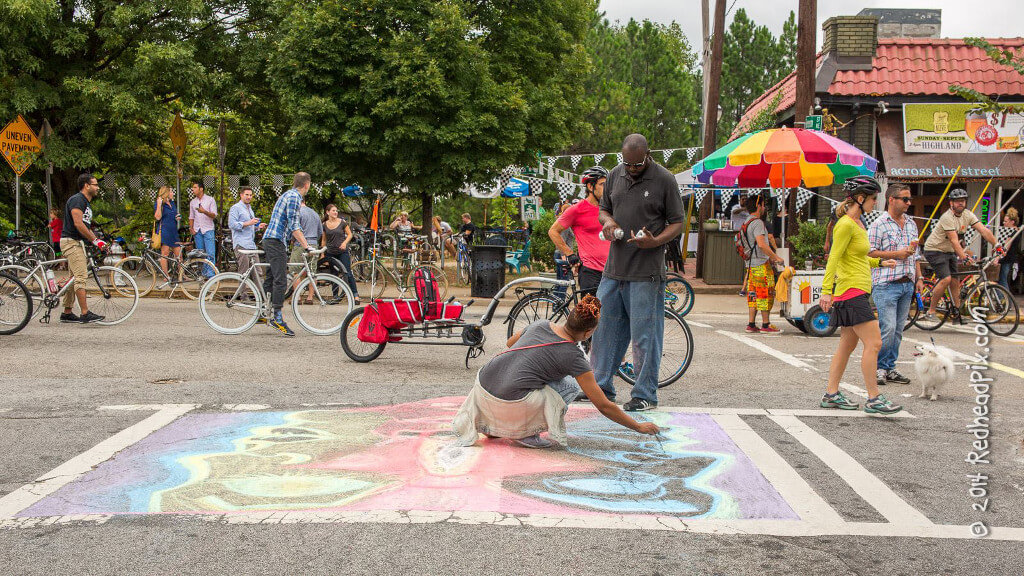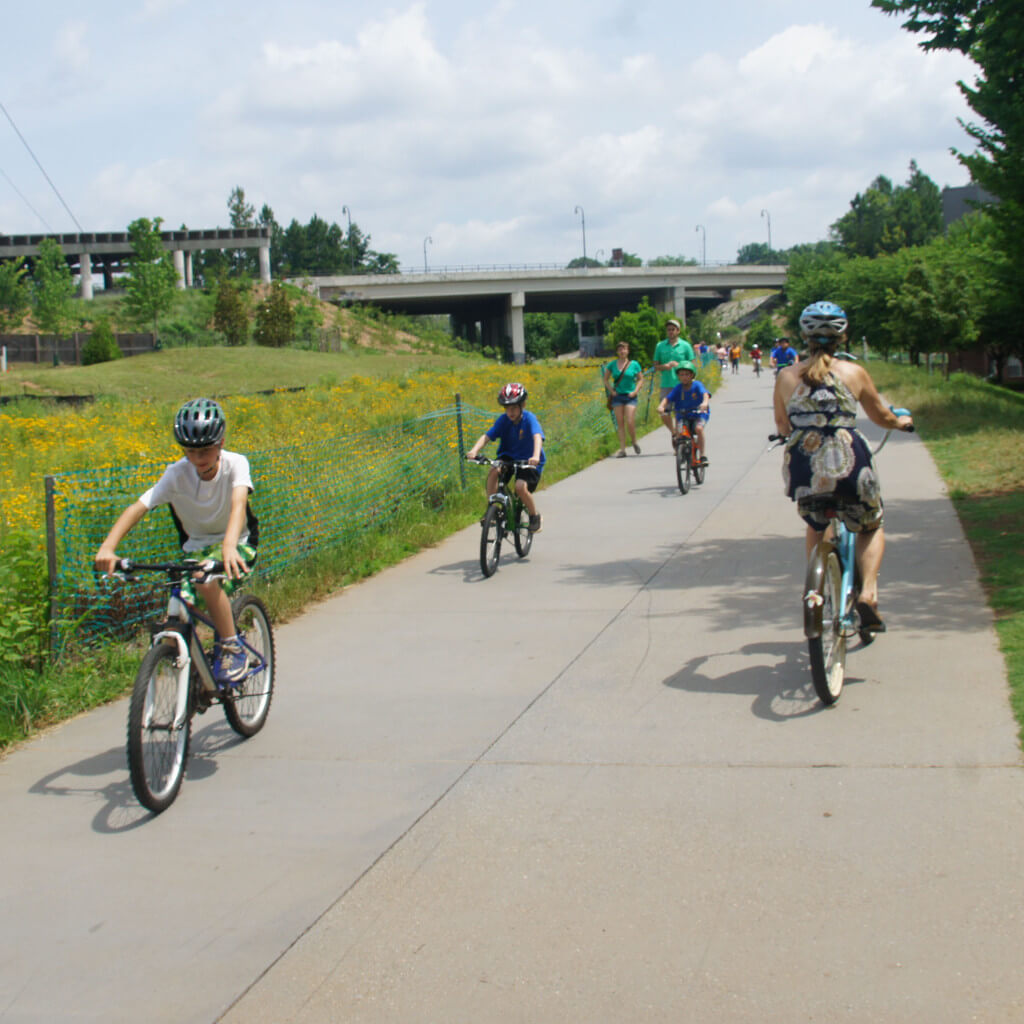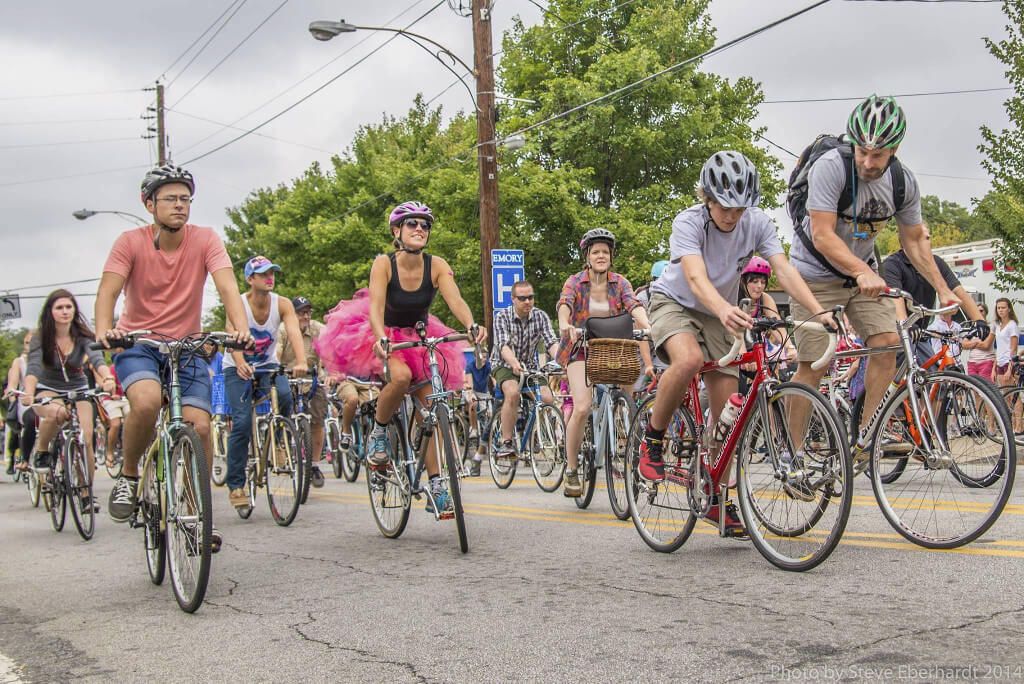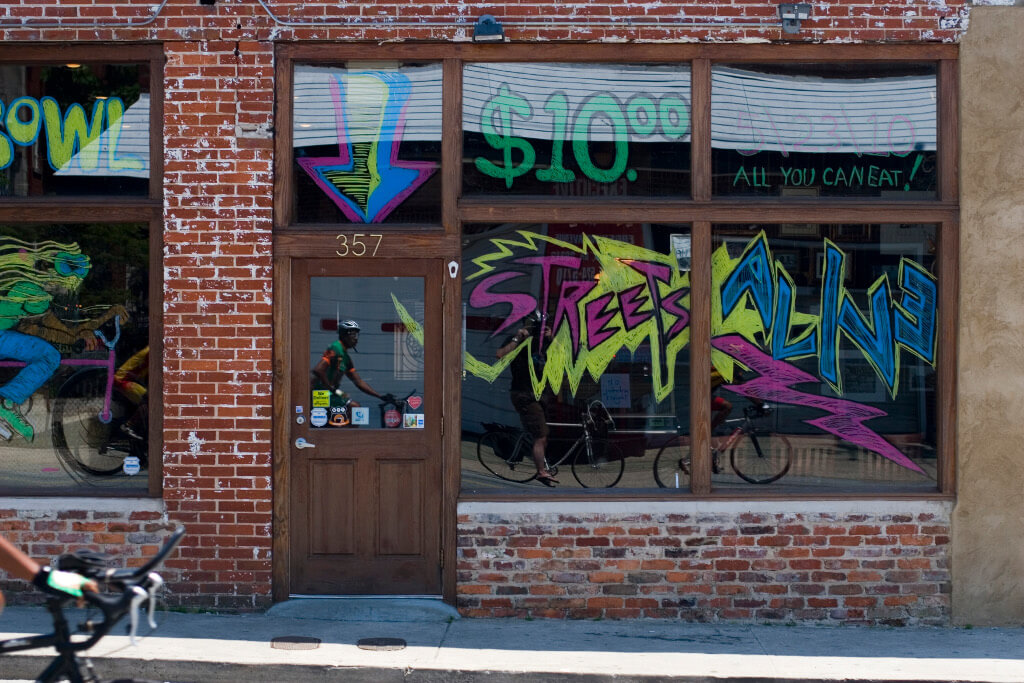Autumn Gear Guide
Find inspiration in our Gear Guide that will keep you out on your bike through wind or rain.
Download NowAtlanta’s emerging bike culture offers fun riding, delicious food, and plenty of open street festivals.

Photo courtesy of Atlanta bicycle Coalition
On September 27th, 2015, the city of Atlanta will be hosting their Ciclovia, Atlanta Streets Alive. Residents and visitors are encouraged to skate, walk, roll, or bike down the streets and take part in all of the events and activities offered all day long. We contacted Rachel Krause, the Communications Manager of the Atlanta Bicycle Coalition, to discuss the emerging cycling culture in Atlanta and what that means for the city.
The Atlanta Bicycle Coalition has been active in the city for 24 years now, addressing three main areas of interest: advocacy, education, and community building.

Photo by Hotlanta Voyeur
With their help, the city is on its way to becoming a bicycle city. Projects such as the BeltLine, two new protected bike lanes this year (more to come), and lots of bike-friendly events are contributing to a growing cycling community. While Atlanta still has a long way to go, progress is being made. The Central Atlanta Progress, the city’s downtown development body, installed a protected two-way bike lane though downtown on Peachtree Ave last year, and the existing protected bike lane down 10th st. in Midtown was extended.
The Atlanta Bicycle Coalition works closely with partners at the City of Atlanta and Atlanta Regional Commission to support further expansion of Atlanta’s bike infrastructure. The City of Atlanta has committed $150,000 to fund Ciclovias in the city in the next year, “which is a testament to how important they view programs like Atlanta Streets Alive that get people active and out in their communities,” said Krause.
People from all over the city are hopping on the bike bandwagon and making use of the resources that being made available to them. Two companies, Bearings Bike Shop, which serves youth in Atlanta, as well as Sopo Bike Co-op, which extends popular programs for homeless individuals and refugees, are just two examples of Atlanta’s determination to ensure everyone has access to bikes and bike education.
Krause let us in on some of her favorite social bike rides in the city: The Mobile Social is a monthly, no-drop group ride that’s open all levels of bikers – commuters, recreational cyclers, and families are all welcome. The rides occur on the second Friday of each month and every ride is different.
Civil Bike Tours provides guided, historic bicycle tours of the city, looking at Atlanta’s rich Civil Rights activist history (this is the birth place of Martin Luther King Jr., after all).
Another favorite Krause notes specifically is the BeltLine Bike tours. The Atlanta Bicycle Coalition hosts two free Atlanta BeltLine Bike Tours each weekend on the Eastside and Westside Trails. The tour goes over the history of the BeltLine and “iconic points along the route, all in friendly, fun atmosphere.”

Photo courtesy of Atlanta bicycle Coalition
As for the “Must-See” attractions? Well, the Atlanta Streets Alive is a crucial event. According to Krause, 132,000 people attended the three routes of the festival in 2014.
The Dick Lane Velodrome is the home of the only velodrome in the world with a tree growing in the middle of it, and hosts amateur races throughout the year.
She also recommended the Ponce City Market, sandwiched between the Historic Fourth Ward Park and the Eastside Beltline Trail. Besides all the awesome shops and restaurants, the building also features impressive bike rooms and a bike ramp to accommodate bicyclists. Or you can head to the Farmers Market to pick up some fresh, local ingredients for an afternoon picnic under Atlanta’s infamous canopy of trees.

Photo by Joel Mann
Krause also noted that the city is “lucky to have some really great businesses who support bike advocacy effort in the city.” A local breakfast favorite is Revolution Doughnuts, because as Krause put it: “Biking burns calories, right?” For coffee to follow that scrumptious doughnut check out Octane Coffee Bar. They have two locations and also happen to be a bar, so if a coffee meeting or date goes a little long, “switching from coffee mode to beer is that much easier.” And for a meal you’ve spent the day working up an appetite for, Noni’s is a unique bar and restaurant that serves delicious tradition Italian Deli Sandwiches by day, and by nigh, awesome cocktail and dance parties. Also great about Noni’s is that “you can ride the new Atlanta Streetcar there (and bikes are allowed on board!).”
Atlanta Streets Alive is coming up on September 27th, 2015. If you’re in the area, it’s a don’t miss event where you will surely realize “how walkable, bikable, and livable Atlanta can be.”
Find inspiration in our Gear Guide that will keep you out on your bike through wind or rain.
Download Now
The tree canopy is “infamous”, seriously? (The trees are quite lovely and a major benefit of living here, thanks.) And we do have too many guns, but the cafes are not dueling. I’ve lived here for 10 years and the Atlanta portrayed in this article isn’t true-to-life, not written by someone who knows the city. Yes, there are growing public cycle accommodations, and the city government is making a real effort, and there are more cyclists and cycle commuters now, and the ABC does great advocacy. Things are improving…slowly. But few people would visit the particular farmers market linked in the article by bike – there are many other seasonal farmers’ markets and produce markets like Sweet Auburn Curb Market (aka Municipal Market), Grant Park & East Atlanta and many other weekly seasonal farmers markets that are more likely shopping/picnic destinations.
It’s a real stretch to call Atlanta “The City of Bikes.” Atlanta is one of the least bicycle-friendly cities in the country. Atlanta is a city of cars, built for cars, made for cars, and dominated by cars. The percentage of bicycle commuters is virtually non-existent. And the number/amount of separated bike lanes is virtually nothing – – – with the few cycletracks and bike lane in-place still being dominated by cars. And the residents are fighting any acceptance as bicycles, as demonstrated by the recent Georgia DOT Peachtree Road fiasco.
I think you mean “Dual Cafe Bars”, rather than “Duel Cafe Bars”.
Don’t forget The Atlanta Cycling Festival – http://www.atlantacyclingfestival.com/.
It would help the acceptance of cycling in Atlanta, and the recognition that bicycles provide a legitimate form of transportation if Atlanta had a bike share system. Atlanta is about the only major city in the USA without bike share, and the only city within the top ten of population that doesn’t seem to be able to make bike share happen. Apparently too much resistance and nobody wants to sponsor it.
I agree Atlanta needs (and wants) bike share. But we’re not in the top ten for population – http://www.infoplease.com/ipa/a0763098.html. We’re #39. Our metro region is big but that’s sprawl for you! The City of Atlanta is under contract with a bike share provider and working on the policies needed to make bike share successful. Don’t give up yet. Sometimes things take longer than you’d like, but that doesn’t mean they won’t happen.
Whether top ten or 39, the point is still the same and still valid. Atlanta is ranked #9 in the country for metropolitan statistical area. All of the top thirteen msa’s have bike share except Atlanta. And from what I read, the mayor or somebody there promised bike share in 2014 or 2015, which doesn’t appear to be happening. One of the things that bike share does is that it legitimizes the city as viewing the bicycle as a valid commuting option. It is a sign that both the government and business acknowledge that bicycle transportation can benefit the city and belong on the streets. The fact that it is so difficult and long-coming in Atlanta is a symbol of what government and businesses there really thing about cycling.
Really, Duel cafe-bars? Are they fighting?
Comments are closed.